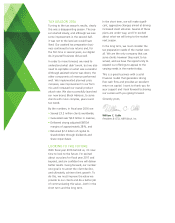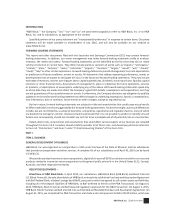HR Block 2016 Annual Report Download - page 13
Download and view the complete annual report
Please find page 13 of the 2016 HR Block annual report below. You can navigate through the pages in the report by either clicking on the pages listed below, or by using the keyword search tool below to find specific information within the annual report.
H&R Block, Inc. | 2016 Form 10-K 5
U.S. Federal Tax Preparer Regulations. U.S. federal legislation requires income tax return preparers to, among
other things, set forth their signatures and identification numbers, including their Preparer Tax Identification Number
(PTIN), on all tax returns prepared by them and retain all tax returns prepared by them for three years. U.S. federal
laws also subject income tax return preparers to accuracy-related penalties in connection with the preparation of
income tax returns. Preparers may be prohibited from continuing to act as income tax return preparers if they
repeatedly engage in specified misconduct.
The U.S. federal government regulates the electronic filing of income tax returns in part by requiring electronic
filers to comply with all publications and notices of the IRS applicable to electronic filing. We are required to provide
certain electronic filing information to taxpayers and comply with advertising standards for electronic filers. We are
also subject to possible monitoring by the IRS, and if deemed appropriate, the IRS could impose various penalties,
including penalties for improper disclosure or use of taxpayer information, other preparer penalties or suspension
from the IRS electronic filing program.
Financial Consumer Protection and Privacy Regulations. The Gramm-Leach-Bliley Act and related Consumer
Financial Protection Bureau (CFPB) and Federal Trade Commission (FTC) regulations require income tax preparers to
(1) adopt and disclose consumer privacy notices, (2) provide consumers a reasonable opportunity to control (via "opt-
out") whether their nonpublic personal information is disclosed to unaffiliated third-parties (subject to certain
exceptions), and (3) implement reasonable safeguards to protect the security and confidentiality of nonpublic personal
information. In addition, the IRS generally prohibits the use or disclosure of taxpayer information by tax return
preparers for purposes other than tax return preparation without the prior written consent of the taxpayer. The CFPB
may issue regulations that apply to our subsidiaries, or certain of our third party service providers that provide
consumer financial services and products. The CFPB may examine, and take enforcement actions against, our
subsidiaries or our third party service providers. See Item 1A, "Risk Factors," for further information on the CFPB and
its recent actions.
State Regulations. Certain states have privacy laws and regulations similar to the U.S. federal regulations described
above. Most states also have data security breach notice laws which may require notice to impacted individuals and
others if there is unauthorized access to certain nonpublic personal information. Several states require income tax
return preparers to, among other things, register as a return preparer and comply with certain registration
requirements such as testing and continuing education requirements. State regulations may also subject income tax
return preparers to accuracy-related penalties in connection with the preparation of income tax returns, and may
prohibit preparers from continuing to act as income tax return preparers if they engage in specified misconduct.
Certain states have regulations and requirements relating to offering income tax courses. These requirements may
include licensing, bonding and certain restrictions on advertising.
Franchise Regulations. Many of the income tax return preparation offices operating in the U.S. under the name
"H&R Block" are operated by franchisees. Our franchising activities are subject to the rules and regulations of the FTC,
potential enforcement by the CFPB, and various state laws regulating the offer and sale of franchises. The FTC and
various state laws require us to furnish to prospective franchisees a franchise disclosure document containing certain
prescribed information. A number of states in which we are currently franchising regulate the sale of franchises and
require registration of the franchise disclosure document with certain state authorities. We are currently operating
under exemptions from registration in several of these states based on our net worth and experience. Substantive
state laws regulating the franchisor/franchisee relationship presently exist in a large number of states, and bills have
been introduced in Congress from time to time that would provide for federal regulation of the franchisor/franchisee
relationship in certain respects. The state laws often limit, among other things, the duration and scope of non-
competition provisions, the ability of a franchisor to terminate or refuse to renew a franchise and the ability of a
franchisor to designate sources of supply. From time to time, we may make appropriate amendments to our franchise
disclosure document to comply with our disclosure obligations under U.S. federal and state laws.
FOREIGN REGULATIONS – We are also subject to a variety of other regulations in various foreign markets, including
anti-corruption laws, and regulations concerning privacy, data protection and data retention. Foreign regulations and
laws potentially affecting our business are evolving rapidly. We rely on external counsel in the countries in which we
do business to advise us regarding compliance with applicable laws and regulations. As our international operations
grow, we continue to develop and enhance our internal legal and operational compliance programs that guide our
businesses in complying with laws and regulations applicable in the countries in which we do business.
























